Oceans And Me: Some Images And Contemplations

Oceans, a living word for me, effervesces myriad images that can run the entire gamut of all the figures of speech of the language of my write. It is not without reason that I take recourse to rhetoric, as I were to discover as an adolescent in a little diary of my late father that, I was a Cancerian, born on the second day of July. With a newfound curiosity and to track down the repertoire of an existential being called ‘I’, I burrowed the recently acquired book in my school library on Sun Signs by Linda Goodman (1968) and rummaged through the pages in the quietude of a deserted dormitory (lest my seniors found me giving wings to a young public school boy’s flights of fanciful overtures that the book was associated with, in those dreamy days of yore), to discover that I was born under a water sign. Linda, besides the usual fare, further forebade that I would take to the water bodies with glee, short of prowling them.
The beauty of our lives is that “intuition goes before you, showing you the way. Emotion follows behind, to let you know when you go astray”. Linda was ‘bulls-eye’; as I was to ascertain later, when a slew of circumstances juxtaposed in a kaleidoscope of changing visions that finally coalesced to find me joining the Indian Navy. The rest can be summed up in Fyodor Dostoevsky’s line from White Nights, “But how could you live and have no story to tell?”
The Navy gave me the opportunities to move on the oceans, fly above it and land on mighty aircraft carriers that majestically prowled the seas, and an invited occasion to go under in the bowels of a submarine. Life was measured in events of variegated experiences interspersed with moments of blissful silences (if you had the flair for it) that gave you time for quiet contemplation; graced in the company of the blue vastness, pounding waves, the elusive horizon and the rapturous company of the flying fish, dolphins, the friendly sea gulls and the impromptu whale. To me, the welcome and unrestricted rains at sea came like fingers tapping at my shoulders beckoning to compose an idyll of relationships, while the vast laden sky with the caressing wind comforted like an umbrella of assuring consolation.
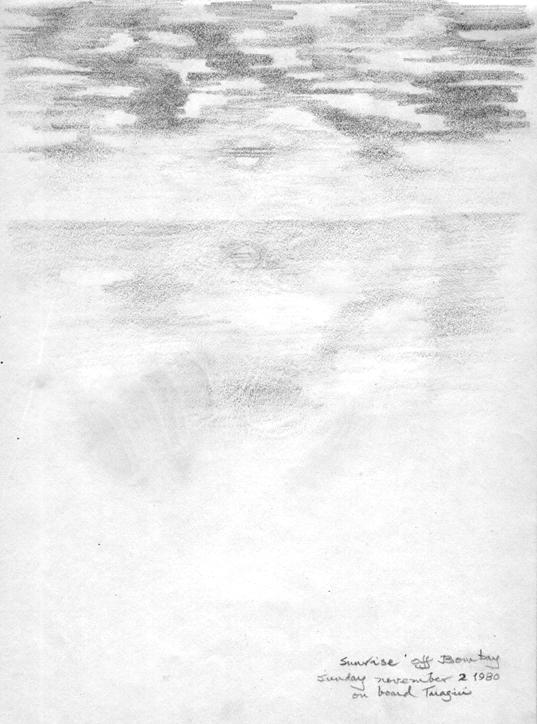
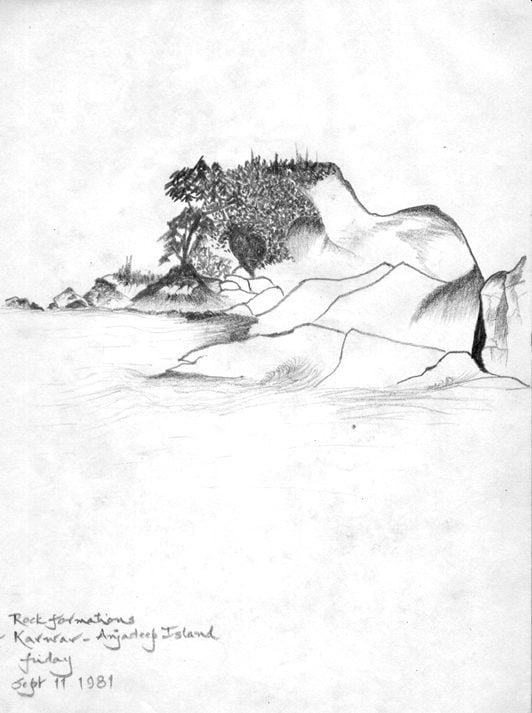
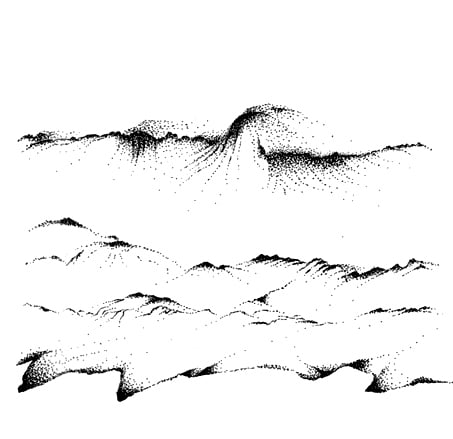
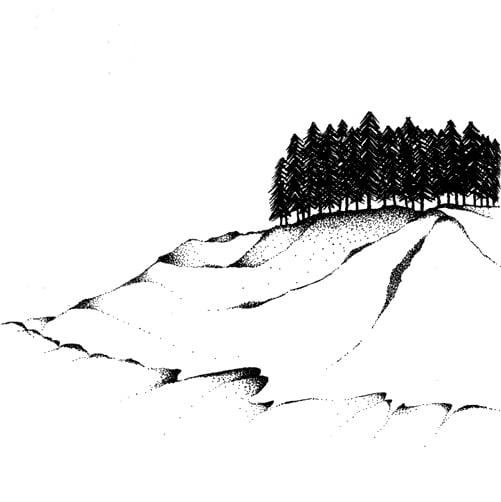
My early introduction to the Ocean was laced with traditions, like a new bride being introduced to the clan. It started with an initiation into the fold of Lord Varuna, the keeper of the Seas and all its trappings; both living and non-living. The Hindu Puranas eulogise Varuna as the god of oceans, the sky, water and the rivers. His consort is Varuni, who married Varuna after she came out of the Samudra Manthan. Varuna is revered as the king of the universe, possessing a thousand eyes with an unlimited knowledge and power over the world. As the keeper of the moral law, he punishes those who transgress his laws but forgives them out of compassion, if they repent and pray. As given in Natyasashtra, the Mantra to Varuna to be uttered at the time of obeisance is as follows, and it became the foundational words of my oceanic initiation:

I was ordained soon to discover the power and authority of the dictum of Lord Varuna (the western equivalent is King Neptune).
Having taken to little scribbles after laying down my uniform, of the many memories and nostalgic recalls, one that is indelibly etched in my mind is the occasion when I crossed the Equator for the first time on March 22, 1974 at 1400hrs IST; on way to Mauritius, aboard the history-laden Naval ship, INS Delhi, the erstwhile Second World War Royal Navy ship HMS Achilles of Battle of River Plate fame. To the ocean traveler, Equator marks the domain of Varuna and every seafarer crossing it for the first time faces the Court of Varuna, wherein you are initiated into the Lord’s domain after you are heard and sentenced, if any, for all your misdemeanours in the traverse of the Lord’s domain.
As the still ship drifted on the equatorial line, I was presented before His Majesty’s court (dramatically enacted by the ship’s selected staff), that consisted of Lord Varuna, his consort Varuni and a few creature representatives of his domain. A scroll of my misconduct, that seemed like from a previous birth, was read out with all seriousness, resulting in a terse verdict to the cheers of Varuna’s subjects, that necessitated I be thrown overboard to the mercy of the oceanic elements.
With sympathy on a flight, I was suitably heaved aloft off my all-fours and thrown overboard, in the good old tradition since the days of Marco Polo, into the waiting watery abode of the Lord’s subjects (while in all seriousness sharpshooters with guns stood on the deck to take care should the Lord’s larger Piscean subjects ‘cross the line’ themselves). It was sometime before I was hauled up, but not before a bellyful of the saline water and many a repetitions of the Lord’s Prayer! It was a humbling experience of being “between the devil and the deep sea”. At the end of the ‘Crossing the Line Ceremony’, a merciful but much cherished certificate was received from the hands of Lord Varuna (the ship’s Captain) himself, as I thanked Linda and her Sun Signs.
(Elsewhere, the ceremony observes a mariner’s transformation from slimy Pollywog, a seaman who hasn’t crossed the equator, to trusty Shellback, also called a Son or Daughter of Neptune. It was a way for sailors to be tested for their seaworthiness.)
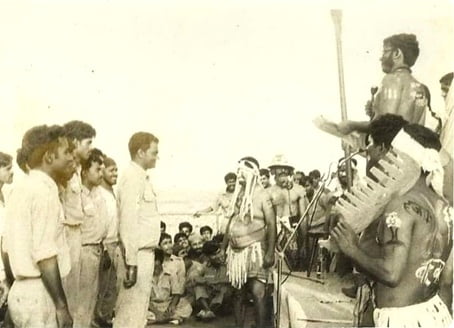
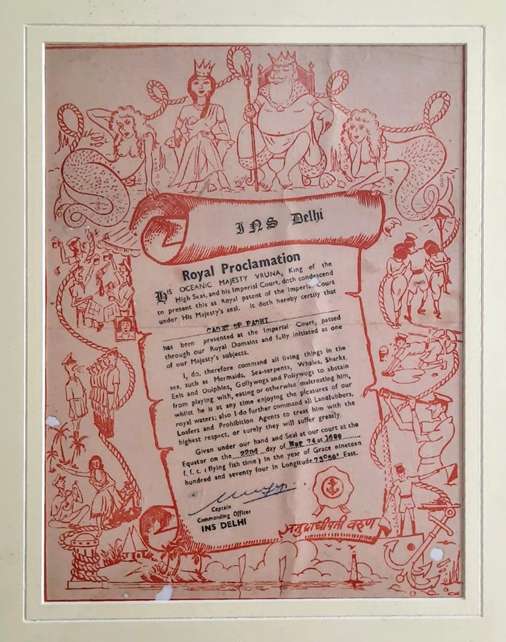
The Oceans were the means of my being, as it were. It stitched itself into my daily life like a fabric that I could not refuse to be wrapped with. Who can forget the young cadets days getting ones sea-legs from scrubbing the wooden decks with ‘Holy Stones’ (as they were called, in reality pumice stones), keeping your ‘Watch’ on the ‘Crows Nest’ (the highest point on the mast that a lookout was placed to forewarn of the land ahead, the failure of which led to the sinking of the Titanic), stretching out on my ‘Bunk’ (the bed in reality) in the ‘Chest Flat’ (the room we shared) after a tiring day of hauling ‘Blocks and Tackles’ (the contraptions that uses the lever system to lift and transfer weights), rising early before the dawn beautified the unresticted distant horizon with myriad colours, to head for the ‘Heads’ (the ablutionary commodes in reality) and many more nuggets of memory’s recalls that would have run parellel to the journals of a James Cook, a Columbus, a Vasco-da-Gama or a Sir Francis Drake of the pirate’s fame. Many of the sailor’s lingo still permeates my house, to the bemoan of an able wife or son. The Ocean was, is and will be all permeating, until I find myself, if lucky, to be consigned to the ‘Davy Jone’s Locker’ (a metaphor for the bottom of the sea).
It is not that the mighty Oceans, expansive and enticing as they are, did not have its moments of despair and uncertainty. It is much akin to the rise and fall of the emotions of a man, full of the idiosyncrasies that we as the highest of species experience. The congruity of emotions of the Oceans and Man has stirred many a writers to kindle their minds.
It roused Shakespeare to quote in his play Much Ado about Nothing:
“Sigh no more, ladies, sigh no more,
Men were deceivers ever,
One foot in sea and one on shore,
To one thing constant never.”
(Wonder, with the induction of women into the Naval ranks lately, what Shakespeare would have coined!)
Hear the lovelorn Juliet proclaiming to her beloved Romeo in the play Romeo and Juliet:
“My bounty is as boundless as the sea, my love as deep. The more I give thee, the more I have,
For both are infinite.”
Or, read the poignant ocean-themed lines of Samuel Taylor Coleridge’s poem, The Ancient Mariner, with the moral of his ballad being to appreciate all forms of life:
“He prayeth best, who loveth best
All things both great and small;
For the dear God who loveth us,
He made and loveth all.”
As I close the day with my oration of the past naval days that came in a flurry of harried emotions; I endear my dear readers to hold breath for the part 2 that will take you closer to the driven realities of the Oceans and Seas of today. Until then, appreciate the following little presentation celebrating the World Oceans Day.
(This is the Part 1 of the 2 Part series on the World Oceans Day)
Also Read: World Environment At Crossroads
Also Read: World Environment: India’s Concern And Contribution
Also Read: World Environment: India’s Future Priorities And A Responsible Citizenry

Comments are closed.